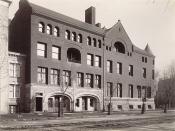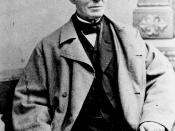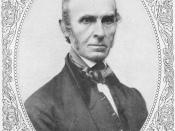Inspired by Nature
Known as the Quaker Poet, the majority of Whittier's work revolved around around the harsh New England farm life with which he was familiar with. Whittier grew up on the Massachusetts farm of his Quaker family. His first poem, published in a local paper when he was fourteen, attracted the attention of abolitionist William Lloyd Garrison, who urged the boy to pursue his education. Though the family had long suffered in poverty, Whittier managed to put himself through two years of school at the Haverhill Academy. In his twenties Whittier began editing regional newspapers. He served one term in the Massachusetts legislature (1835) and was one of the founding leaders of the antislavery Liberty Party in 1839. Throughout the 1830s, 1840s, and 1850s, he continued his newspaper work, editing several abolitionist papers in a time before the antislavery movement was generally favored in the North. At the same time, he wrote prose and poetry about his own rural region, collected in such volumes as Legends of New England (1831) and Lays of My Home (1843).
Whittier's reputation received a boost in 1857, when the new Atlantic Monthly started to publish his poems and humorous tales. His long poem Snow-Bound (1866) ensured Whittier's fame and financial well-being for the remaining years of his life. "Although his early life was one of relative hardship and isolation, his constant exposure to the wonders of nature gave him a poet's appreciation for the beauties of the world around him," said famous americans an internet biography site.
John uses New England's nature as a setting and often theme for a majority of his poems. Snow Bound is an idyllic picture of his boyhood home. In his poem he skillfully paints an image in our head with his words. He wrote in a...


